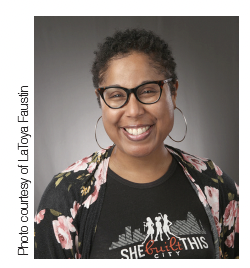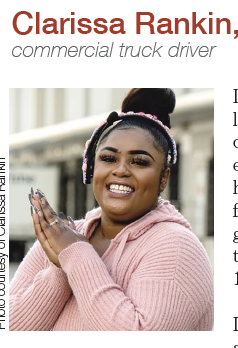By Cheryl Clemmons
These two Charlotte women are defying stereotypes and forging their own paths in fields typically dominated by men. The vision, grit and drive these women show every day in pursuit of their unconventional dreams is worth recognizing.
LaToya Faustin, executive director of She Built This City, wants girls and young women to develop skills in construction now so they can earn high salaries and banish stereotypes in the future.
The organization seeks to spark interest and build pathways for youth and women in marginalized communities to enter the workforce by providing career coaching for transitioning women into apprenticeships and employer connections.
Faustin said the U.S workforce is changing, and more women are qualified for non-traditional jobs. “Wouldn’t any woman want to earn $25 an hour working in the trades rather than making minimum wage standing behind a cash register for eight hours a day? Women are not unfamiliar with hard work. We are detail oriented and great communicators. We can excel in the construction business.”
According to industry statistics, women made up 6.2 percent of the 8 million construction workers in the U.S. between 2020-2022.
She Built This City was founded over 20 years ago. Faustin’s interest in construction stems from the history of how black communities were originally created by black tradespeople who built affordable housing.
She joined the board as Chief Operating Officer in 2020 working with founder Demi Knight Clark, and became Executive Director in 2021. The program offers camps, workshops and women-focused career training that starts with girls ages 9-12 in areas including construction, engineering, equipment operation, entrepreneurship and after-school activities to provide finished projects to local charities.
Middle school girls train to become entrepreneurs and learn a trade with the goal of joining programs in high school and learn how to pitch their ideas to local builders.
Graduates mentor younger students as “pay-it-forward” ambassadors. Graduating high school senior girls can seek advanced training through three-month programs in the area of their choice, and 20-plus and career-transitioning women find opportunities and/or training in construction, automotive, manufacturing and tech trades.
“The program puts the girls on a path to becoming successful and confident,” Faustin said. “And they’ll change the stigma of women working in construction. Give a woman a job, and we can do anything.”
For more information, visit shebuiltthiscity.org
Ladies, tired of your boring, low-paying job? Well, charismatic and seriously enthusiastic Clarissa Rankin has a lucrative career choice for you, and she gives her “five great reasons” to become a truck driver on TikTok to her 1.8 million followers.
“I love to be able to travel. I love Income. I love being a superhero,” Rankin said. “As long as these wheels are turning, you need me. My job is not going anywhere. And to make six figures in income, I only had to go to school for two months. Those are the reasons. So, say it loud, say it proud. It’s truckers life baby!”
Rankin’s wit and humorous tales of life on the road have also been featured on the ”Inside Edition” television show.
The married mother of two earned her Commercial Drivers License in 2017 and never looked back. In 2022, the number of women employed in the truck transportation industry hit 1.6 million, a record since the U.S. Bureau of Labor Statistics started tracking the numbers in 1990. Drivers can earn as much as $250,000 annually, however, the pay can fluctuate due to increases in fuel prices. Women’s share of the trucking industry workforce is now at an all-time high of nearly 18 percent, mostly in truck-driving roles.
“This is the place to be for women who want to make some real money,” said Rankin, who earns over $150,000 annually driving, in addition to making about $12,000 in endorsements from social media where you can find her educating her followers with tales of the life of a female trucker.
While she loves her profession, Clarissa is quick to acknowledge that women face harassment and pay discrimination. But, she said, the widening of opportunity for women to work in high-paying jobs traditionally reserved for men is still long overdue. She asserts, “It’s our time ladies.”
Find Clarissa on TikTok @clarissarankin


